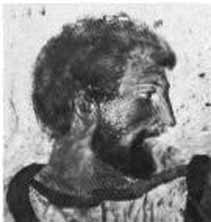Servius Tullius
A Roman Cognate to Heimdall-Scef
An Original Theory by Carla O'Harris
with research help from Siegfried Goodfellow
[Main][Home]
 |
 |

The Legend of Scef-Sceaf
This might prove useful as a resource:
http://www.squirrel.com/asatru/nidhad/heimdall.txt
Scef is a legendary Scandinavian king known from several Anglo-Saxon sources.
Æthelweard in his Chronica writes of Sceaf:
This Scef came in a light boat to an island of the ocean which is called Scani, arms around about him, and he was a very young boy, unknown to the dwellers in the land. But he was accepted by them and cared for like one of their own kind, and afterwards they chose him as king, from whose family descended King Æthelwulf.
William of Malmesbury in his Gesta regum anglorum wrote:
"Sceaf; who, as some affirm, was driven on a certain island in Germany, called Scandza, (of which Jornandes, the historian of the Goths, speaks), a little boy in a skiff, without any attendant, asleep, with a handful of corn at his head, whence he was called Sceaf; and, on account of his singular appearance, being well received by the men of that country, and carefully educated, in his riper age he reigned in a town which was called Slaswic, but at present Haithebi; which country, called old Anglia, whence the Angles came into Britain, is situated between the Saxons and the Goths."
The opening sequence of the Beowulf epic, mentions a king called Scyld Scefing, which might mean Scyld descendant of Scef, Scyld son of Scef, or Scyld of the Sheaf. After relating the glories of his reign, the Beowulf poet gives an account of Scyld's funeral, how his body was laid in a ship surrounded by treasures, saying:
"They decked his body no less bountifully
with offerings than those first ones did
who cast him away when he was a child
and launched him alone out over the waves."
In the Eddas, the god Heimdall is of mysterious origin.
In the Prose Edda, Snorri Sturlesson says that Heimdall was born of nine giantesses. Quoting an otherwise lost Eddic poem he calls Heimdalsgaldr, he writes:
"I am the son of nine mothers, nine sisters too"
In Eddic poem Hyndluljóð 37, Heimdall is said to be born nine giantesses, at the edge of the world. These giantesses are commonly identified as representatives of the waves, indicating that Heimdall was born beyond the sea.
From the Eddic poem Rigsþula, we learn that Heimdall first came to Midgard as Rig. By this name, he visited the earliest generations of human beings after Ask and Embla, fathering three male children (Jarl, Karl and Thrall), representative of each level of the ancient Scandinavian caste system, thereby sanctifying the social stratification of Old Norse society.
In his insightful investigation, Viktor Rydberg has theorized that it was the young Heimdall, sent across the waves by the Vanir gods, who arrived as Scef and established the caste system, as Rig.
We find a similar figure among the Romans.

Servius Tullius
Livy, The History of Rome, Book I,
Chapter 39:
"At this time there happened in the house
of the king a portent which was remarkable alike in its manifestation and in its
outcome. The story is that while a child named Servius Tullius lay sleeping, his
head burst into flames in the sight of many."
Young boy, fire blazing about his head.
"Then, taking her husband aside, Tanaquil
said: “Do you see this child whom we are bringing up in so humble a fashion? Be
assured he will one day be a lamp to our dubious fortunes, and a protector to
the royal house in the day of its distress. Let us therefore rear with all
solicitude one who will lend high renown to the state and to our family.” [4] It
is said that from that moment the boy began to be looked upon as a son"
Just as Scef is found and the people
decide to raise him. He is prophecied to be a "lamp" to their fortunes, and a
"protector of the royal house", just as Heimdall is.
"It was a thing easily accomplished,
being the will of Heaven. The youth turned out to be of a truly royal nature"
A royal nature : Rig. This was the "will
of Heaven", ie., the Gods had sent him.
In 39.5, Livy disputes that just because
he was called "Servius" (ie., Latin for "slave") that he was actually born of a
slave-mother, but in fact, his mother was a noblewoman who was captured in war,
but never reduced to slavery, instead being brought to the palace where she was
allowed to raise her son. This suggests a tradition that he was more highborn,
but came in from some other place. The euhemerization turned this into having
been a captive of war. Is it possible there is just a trace of the Van-As War
here? Particularly if we think of the First Van-As conflict with Lodur, etc? In
any case, the young boy being a stranger from another tribe having come to the
palace, just like Scef.
Continuing, Chapter 40 :
"not only the king, but the Fathers and
the commons too, held Servius Tullius in the very highest honour."
So Servius was held in honor by all the
people, high and low. Compare "fathers and commons" to "sons of Heimdall, high
and low".
The king's sons are jealous about :
"Rome should be ruled by a stranger whose
descent was derived from a race not only remote but actually not even Italian"
So again, this is a stranger of another
race. (As we know, a divine one.)
Underlined here again, with some court
intrigue added (this could be an echo of the strife of Gullveig in the time of
Scyld, Scef's son, or it could be a little Shakesperian style drama added in by
the Roman euhemerists. Remember, with the Romans these stories got greatly
modified under their euhemierzation):"
"after Tarquinius' death the sovereignty
would not revert to them, but, plunging down to yet baser depths, would fall
into the hands of slaves; so that where, a hundred years before, Romulus, a
god's son and himself a god, had borne sway, so long as he remained on earth, in
that self-same state a slave and [p. 143]the son of a slave woman would be king.
It would1
be not only a general disgrace to the Roman name, but particularly to their own
house, if during the lifetime of Ancus' sons it should be open not only to
strangers, but even to slaves to rule over the Romans."
Note that the tradition states that the
kingly line would then descend from Servius Tullius. It also speaks to the
legend of him as low-born and foreign again. We can see here the fairy tale
motif of the prince and the pauper, the shepherd-boy who would be king, etc. The
Beowulf poem speaks of Scef as a foundling, of unknown heritage, an orphan ...
very low-born as it were.
The jealous sons kill their father, the
king, and the queen appeals to Servius to avenge the king :
"“To you, Servius,” she cried, “if you
are a man, belongs this kingdom, not to those who by the hands of others have
committed a dastardly crime. Arouse yourself and follow the guidance of the
gods, who once declared by the token of divine fire poured out upon this head
that you should be a famous man. Now is the time for that heaven-sent flame to
quicken you! Now wake in earnest! ... Consider what you are, not whence you were
born. If your own counsels are benumbed in this sudden crisis, at least use
mine.”"
"Heaven-sent flame", "divine fire", "of
the gods". Appealing to deeds rather than birth.
"she commanded that the people should
obey Servius Tullius, who would dispense justice and perform the other duties of
the king. [6] Servius went forth in the royal robe, accompanied by lictors, and
sitting in the king's seat rendered judgment in some cases, while in regard to
others he gave out that he would consult the king."
So he's sorta a king ("Rig") and sorta an
advisor, just like Scef, the progenitor of kings and called "King" for being the
first in the line, but not quite a king, which waits for Halfdan. Also, he
"renders judgement", which in the Teutonic case would have fallen upon his son,
Jarl/Scyld/Domar, but of course, Roman tellings compress things immensely.
In his time, treachery began to overtake
the royal house, just as Gullveig was always the favorite (or sweet odor) of ill
nations :
"jealousy of his power, even among the
members of his household, created an atmosphere of treachery and hostility. "
A reference to Heimdall's role on the
Vanir's side in the original Van-As conflict? :
"Most opportune for the tranquil
preservation [p. 149]of the existing state of things was a war which was2
undertaken against the people of Veii —for the truce3
had now run out —and the other Etruscans. [3] In this war the bravery and good
fortune of Tullius were conspicuous; and when he had utterly defeated the vast
army of his enemies, he found on returning to Rome that his title to the
kingship was no longer questioned, whether he tested the feeling of the Fathers
or that of the commons."
Note, he was foremost in the battle where
his bravery showed, and he defeated the enemies (the Vanir defeated the Aesir).
(I'll admit I may be stretching it a bit on this point. But who knows? Reading
such euhemerizations is difficult.)
Again, note he was now approved by
"Fathers and commons", "high and low".
Now, just as Rig established the classes
of jarl, carl, and thrall, note Servius here :
"Servius intended that posterity should
celebrate himself as the originator of all distinctions among the citizens, and
of the orders which clearly differentiate the various grades of rank and
fortune."
He allows all the people to participate
in war, according to their ability to equip themselves :
"For he instituted the census,4
a most useful thing for a government destined to such wide dominion, since it
would enable the burdens of war and peace to be borne not indiscriminately, as
heretofore, but in proportion to men's wealth. He then distributed the people
into classes and centuries ..."
Note there is an element of social
justice : those who have more have to bear more. This is a class system, but
it's a benevolent one with noblesse oblige.
Social justice, but with a ranking system
:
"All these burdens were shifted from the
shoulders of the poor to those of the rich. [10] The latter were then granted
special privileges: for manhood suffrage, implying equality of power and of
rights, was no longer given promiscuously to all, as had been the practice
handed down by Romulus and observed by all the other kings; but gradations were
introduced, so that ostensibly no one should be excluded from the suffrage, and
yet the power should rest with the leading citizens."
The rich have to bear more burdens, but
in exchange, they are given more privileges. Those who didn't have enough money
to go to war, the very poorest, were exempted (just as I imagine thralls did not
go to war). Everyone participated in "suffrage", in the government of the tribe,
but there was more power with "the leading citizens", the nobility.
He seems to institute a land distribution
custom similar to that which Caesar observed amongst the Germani :
"
For, having divided the City according to its inhabited regions and hills into
four parts, he named them “tribes,” a word [p. 155]derived, I suppose, from
“tribute”;4
for this5
likewise the same king planned to have apportioned equitably, on the basis of
the census"
"he proceeded to gain the goodwill of the
commons by dividing among all the citizens the land obtained by conquest from
the enemy; after which he made bold to call upon the people to vote whether he
should be their ruler, and was declared king with such unanimity as none of his
predecessors had experienced."
The land was divided up equally amongst
the people, just as Caesar observed with the Suebi. In the latter case, land
taken by conquest.
He instituted the habit of a holy ve or
sacred grove type space :
"
This space, which the gods forbade men to inhabit or to till, was called
“pomerium” by the Romans"
It then says that he wished to bring
diplomacy to bear on forging peace for his peoples. In this euhemerized version,
he lobbies to have a Temple of Diana built, as that was a goddess of their
enemies, in Rome. I suggest that this shows the acceptance of foreign gods in a
peace treaty, similar to the Vanir and Aesir coming together in peace after
their strife, with mutual recognition of their divinities. Note that with this,
he is here instituting religion, or at least a shift in religion, just as
Heimdall set up the priesthood.
But within the royal house all is not
well. There are some amongst the rich who resent the social justice system, just
as there were earls seduced by Heid whom Scyld would eventually have to fight.
Servius' son-in-law assembles the nobility and says of Servius :
"Such having been his birth, and such his
appointment to the kingship, he had been an abettor of the lowest class of
society, to which he himself belonged, and his hatred of the nobility possessed
by others had led him to plunder the leading citizens of their land and divide
it amongst the dregs of the populace. [12] All the burdens which had before been
borne in common he had laid upon the nation's foremost men. He had instituted
the census that he might hold up to envy the fortunes of the wealthy, and make
them available, when he chose to draw upon them, for largesses to the
destitute."
Note that despite the fact that Servius
Tullius had given great privileges to the noble class, they resented having to
help out the other classes at all. (Do times ever change?) He expected the
nobility to give more than others, a kind of "graduated progressive income tax",
if you will ; just as nobility amongst the Teutons were expected to be
"gold-haters" who gave generously to the folk. In fact, Jarl is spoken of as
generously handing out the gold he seized in his raids. This also shows that the
Servius figure was called upon by the lower orders as being sympathetic to them
as well. Heimdall, of course, gave even thralls his divine blood -- making all
men brothers, even if some were lower than others.
The rising evil of the kingdom inspires
the son-in-law to kill Servius. Livy ends the short narrative :
"Servius Tullius had ruled forty-four
years, so well that even a good and moderate successor would have found it hard
to emulate him."
So "good and moderate" was Servius
Tullius that even the best of men found it hard to emulate him.
In sum, then :
1. Boy comes to kingdom of foreign
origin, taken in and raised as their own.
2. Divine fire from heaven surrounds his
head, prophecying that the line of kings will descend from him.
3. When he is older and rules the
kingdom, he divides the people into classes, giving the higher classes more
power but also more burdens, having to shoulder taking care of the less
fortunate. He is honored by both high and low.
4. Fights a war with a neighboring city,
wins, and then institutes peace by bringing their temple amongst them, and thus
institutes religion.
5. In his time, jealousy and treachery
begin to create intrigues and resentment amongst the people. This eventually
ends his reign.
We have here Scef-Rig, Heimdall as Agni
with the sacred fire, the coming of Gullveig's strife, etc.
Not bad for a short nine chapters (39 -
48) in Livy.
Now if these parallels seem small,
consider that the parallels for Tyr and Odin are much smaller. In the first
case, we have the one-armed Mucius Scaevola, who sacrifices his hand to save the
city (very short tale, one parallel, but Dumezil considers it sufficient), and
in the second case, we have Horatio Cocles (Horatio "One-Eyed", Cocles related
to cyclops), who defends the city of Rome single-handedly against attackers and
throws himself into the river to stop their advance. (Odin defending Asgard
during Van-As War? Only solid parallel is his one eye. Again, Dumezil still
considers him cognate.) Yet here, we have five solid parallels. I think we've
got a Heimdall cognate here!
We also have a short summary of Livy's
books from another source, which tersely states :
"Servio Tullio caput arsit. Servius
Tullius Veientes devicit et populum in classes divisit, aedem Dianae dedicavit.
"
(Not my translation)
"Flames near the head of Servius Tullius.
Servius Tullius defeated the Veientans, divided the people in classes, and
dedicated the sanctuary of Diana. "
Those were the details thought important
by the Romans in their short summary : flames, classes, instituted religion,
specifically of previously hostile tribes.
[Main][Home]